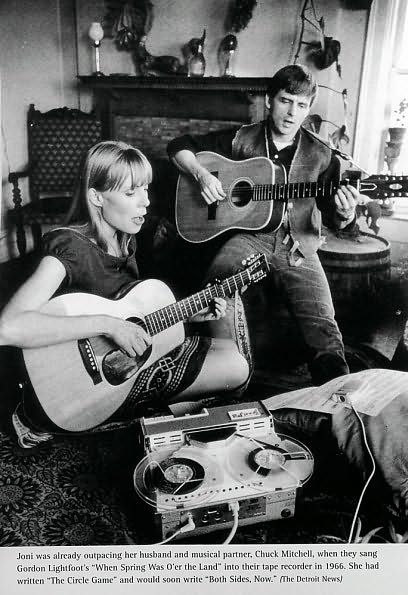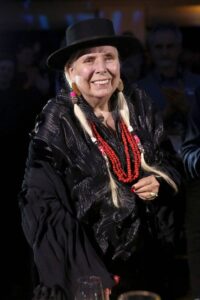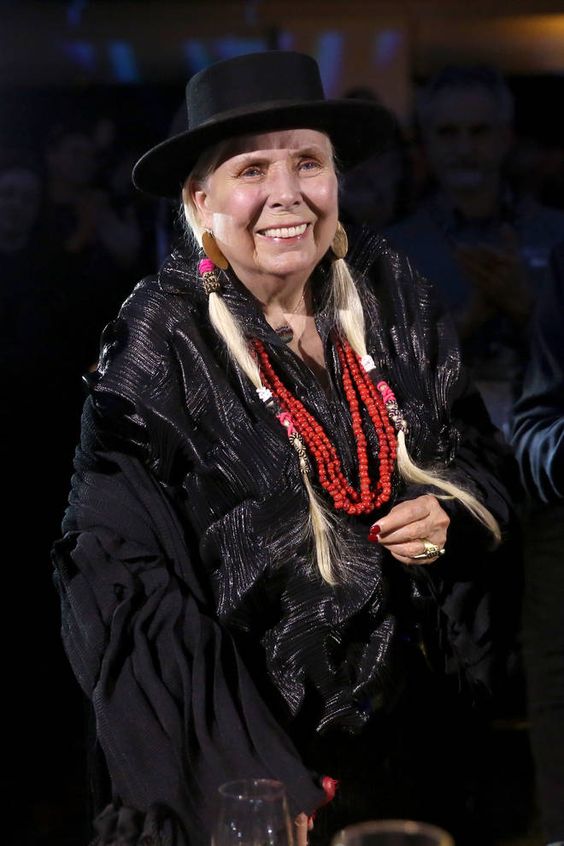(Great songs, well played… and the long career.)

Earlier, at the outset of the summer, I hooked down to Ollies in Champaign and bought what I thought might be enough books to last the season. One of the books was Reckless Daughter, by David Yaffee. The reckless daughter in question was Joni Mitchell, née Roberta Joan Anderson. Yaffee, a fan, a writer, got lucky and met Joni on the late side of her long slide from cultural phenomenon to living legend.
I never got lucky. In fact; opposite. I bought a copy of Ladies of the Canyon not too long after it came out in 1970. I was in high school, Montgomery Blair, Silver Spring Maryland. My copy got played a few times. I loved it, of course, but was only dimly aware of its significance or that of the artist. It went to school with me for some reason and got ripped off from my pile of books and papers in the electronics lab. I never replaced it. It wasn’t possible, of course, to completely forget about Joni Mitchell. She was on the ascendant, and, as a Washington DC area resident, the culture she arose in was exploding all around us. But when I picked up Reckless Daughter, and wanted musical ‘illustrations,’ I was unable to find any Joni Mitchell in my collection of recordings. No vinyl, no cds, no cassettes, nada. So although I got the bio at Ollies cheap, I ended up paying for the following Joni Mitchell cds: Anthology I, Anthology II, The Reprise Years, and The Assylum Years. These are my thoughts about that:
I’ve been working on archives myself, so I am not surprised that many major artists are also doing so. None of us are getting any younger. The Joni archives are fascinating. First of all, there’s a glimpse of her as a folk artist, doing folk songs. Her choice of material is a window into her being, and hers is a being of rare determination and sensitivity. By the time I bought Ladies of the Canyon, she’d already gotten to famous, and even a moment in her space would’ve incinerated any but the stone-hearted and hearty. Some mag, I think it might’ve been Rolling Stone, called her “the queen of El Lay.” A cruel remark, one that referenced her tendency towards serial monogamy, rotating lovers, and writing her songs about it. I’m sure the remark hit home, made her laugh, and gave her bitterness at the biz a bit more sting. As a pin-up figure, Joni was the dangerous grail for countless boys and girls. And she lived it. She wrote it, she drew it, she played it. She altered her course for no one. As Schoenberg said of Ives, ‘she accepted neither praise nor blame.’
Second of all, in the archives, one is treated to her developing conceptions of the performance of her famous songs. The songs themselves, the lyrics and the tunes, don’t change much. The tempi, the phrasing, sometimes the guitar accompaniments, these things are in a certain amount of flux and instability. The songs I know, and I think, therefore, we all know well, ie., Morgantown, Circle Game, Both Sides Now, Big Yellow Taxi... these are set in stone on their LPs, recorded later, and the performances of them when newer are enlightening. Morgantown particularly starts out quite far afield from its eventual shape and sound. The performance at the 2nd Fret, in Philly in ’67, is considerably more dissonant, more tense, slower, more ornate than what ended up on Ladies.
By the time she gets to the Canterbury House in Ann Arbor, on October 27, 1967, her repertory, as recorded on her first Reprise albums, Blue being an exception and exceptional, has stabilized, and has become, essentially, what she recorded.
John Lennon, in full asshole mode, and according to Joni, upbraided her for ‘giving her best material away’ to Judy Collins, etc. “Don’t you want hits,?” he asked (she says). They were recording in LA in adjacent studios. The damaging effects of drugs and an out of control personality, we note, eye rolling, trying like hell to excuse Lennon. He’s officially looked at life from both sides now. And Joni, of course, has not completed her journey, even now. So there. But there she was, in LA, working on Court and Spark.
Also, by the time of the Ann Arbor gig, Joni’s voice has settled into its mature form. Excellent pitch, control of multiple registers, unique ornamentation and glissandi, the admirable instrument we know and love, along with her unique and peerless guitar work, it’s all right there. This is how my preferred heros and heroines operate: they get their shit together, keep innovating, and pay the dues before the tape (or whatever it is these days) rolls. Unlike, well, me.
We don’t know how the story ends, but we know how it continues. Her life on stage has developed over the years, as well. She stayed true, and was abandoned by most of the public. She came to loathe the music business. She was deeply offended, and the easy laugh was muted, though it never disappeared. Years of cigarettes robbed her of that upper register, but not her insight. She tried to stay current, sort of, kept trying new things, but hated Thomas Dolby as a person and collaborator. She went synth, got a guitar that remembers her tunings, and got up to her elbows in jazz. At a certain point, I think, she gave up having lovers. She gave up, in general. She has made at least one or two comebacks.
Her archives, her work, her past, she herself… are well worth considering. The challenge is rewarding and rewarded.

